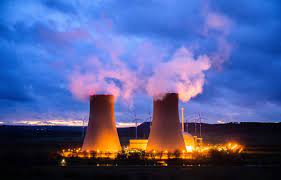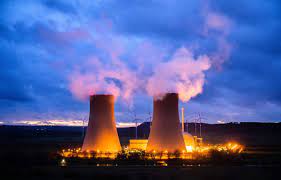
According to a study published on Tuesday, a projected new generation of tiny nuclear reactors will generate more waste than current reactors, and procedures to make some types of trash safe could be exploited by militants seeking fissile materials.
The initiatives, known as small modular reactors (SMR), are intended to be simpler and safer in the event of an accident than traditional plants. They are also projected to be manufactured in factories, as opposed to today's enormous light-water reactors, which are built on-site and frequently go over budget by billions of dollars.
SMR supporters argue that they are a safe approach to increase generation of almost emissions-free electricity and will help to mitigate climate change.
According to a research published in the Proceedings of the National Academy of Sciences, the reactors would emit up to 30 times more radioactive waste per unit of electricity generated than conventional reactors.
Some of the reactors, with molten salt and sodium-cooled designs, are likely to produce waste that will require extra conditioning before being stored in a repository. According to the report, these treatments are vulnerable to being transformed by terrorists into fissile materials for a rudimentary nuclear bomb.
SMR designers, according to Allison Macfarlane, a co-author of the paper and former director of the United States Nuclear Regulatory Commission, "don't pay that much attention in general to the waste... because the thing that produces money for them is the reactor."
"But it's important to know about the waste products and whether they're going to pose any difficulties in disposing of them and in managing them," Macfarlane said.
After Washington stopped funding the Yucca Mountain waste dump in Nevada, the US has no strategy to permanently store long-term, hazardous nuclear waste. Instead, the waste, known as spent nuclear fuel in the industry, is generally stored at nuclear power plants in pools and, later, in dry casks composed of steel and concrete.
"Even if we had a robust waste management program, we think there would be a lot of challenges to deal with some of the SMR waste," said Lindsay Krall, the study's lead author.
The study discovered that NuScale Power Corp reactors, which may employ light water as a coolant like conventional nuclear plants, would produce around 1.7 times more trash per energy equivalent than traditional reactors.
According to Diane Hughes, a NuScale spokesman, the analysis relied on outdated design information and made inaccurate assumptions about the plants.
Other reactors planned by Terrestrial Electricity and Toshiba Corp (6502.T) that will use different fuels and coolants than traditional reactors are also predicted to generate more waste per unit of energy, according to the report. According to the report, those reactors would most likely require further procedures known as conditioning, which would provide paths for proliferation.
Terrestrial Energy's CEO, Simon Irish, stated that the plant will generate less trash per unit of power and that the company is working on a conversion technique to make waste more geologically stable than waste from present reactors.
(Source:www.bbc.com)
The initiatives, known as small modular reactors (SMR), are intended to be simpler and safer in the event of an accident than traditional plants. They are also projected to be manufactured in factories, as opposed to today's enormous light-water reactors, which are built on-site and frequently go over budget by billions of dollars.
SMR supporters argue that they are a safe approach to increase generation of almost emissions-free electricity and will help to mitigate climate change.
According to a research published in the Proceedings of the National Academy of Sciences, the reactors would emit up to 30 times more radioactive waste per unit of electricity generated than conventional reactors.
Some of the reactors, with molten salt and sodium-cooled designs, are likely to produce waste that will require extra conditioning before being stored in a repository. According to the report, these treatments are vulnerable to being transformed by terrorists into fissile materials for a rudimentary nuclear bomb.
SMR designers, according to Allison Macfarlane, a co-author of the paper and former director of the United States Nuclear Regulatory Commission, "don't pay that much attention in general to the waste... because the thing that produces money for them is the reactor."
"But it's important to know about the waste products and whether they're going to pose any difficulties in disposing of them and in managing them," Macfarlane said.
After Washington stopped funding the Yucca Mountain waste dump in Nevada, the US has no strategy to permanently store long-term, hazardous nuclear waste. Instead, the waste, known as spent nuclear fuel in the industry, is generally stored at nuclear power plants in pools and, later, in dry casks composed of steel and concrete.
"Even if we had a robust waste management program, we think there would be a lot of challenges to deal with some of the SMR waste," said Lindsay Krall, the study's lead author.
The study discovered that NuScale Power Corp reactors, which may employ light water as a coolant like conventional nuclear plants, would produce around 1.7 times more trash per energy equivalent than traditional reactors.
According to Diane Hughes, a NuScale spokesman, the analysis relied on outdated design information and made inaccurate assumptions about the plants.
Other reactors planned by Terrestrial Electricity and Toshiba Corp (6502.T) that will use different fuels and coolants than traditional reactors are also predicted to generate more waste per unit of energy, according to the report. According to the report, those reactors would most likely require further procedures known as conditioning, which would provide paths for proliferation.
Terrestrial Energy's CEO, Simon Irish, stated that the plant will generate less trash per unit of power and that the company is working on a conversion technique to make waste more geologically stable than waste from present reactors.
(Source:www.bbc.com)





